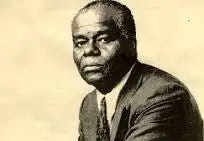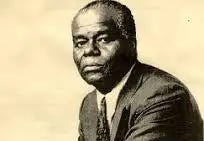Today In Black History: Dr. John Henrik Clarke
Award-winning Pan-African Scholar, Professor, and Author
Issue #690 Today In Black History, Friday, August 2, 2024
Did you know that you can listen to each “We Are Speaking” post on the Substack App? Download the app!
Help us to reach our August 2024 goals: +150 total new subscribers, including +37 new paid subscribers:
Please share and subscribe to help us grow our publication.
Who are your “Fav Five” who would enjoy “We Are Speaking?” Send them the link!
If you like us, REALLY like us, please click the “Like” button at the end of this post!
We appreciate your support!
Today’s Black History WOW!
Dr. John Henrik Clarke was a Pan-Africanist writer, historian, professor, and a pioneer in the creation of Africana studies and professional institutions in academia starting in the late 1960s.
John Henrik Clarke was born on January 1, 1915, in Union Springs, Alabama. His early education was limited; he often had to teach himself, reading voraciously about African history and the African diaspora. His hunger for knowledge ultimately led him to Harlem, New York, where the vibrant cultural and intellectual environment would shape his career.
Arriving in Harlem at the age of 18 in 1933, Clarke developed as a writer and lecturer during the Great Depression years. He joined study circles such as the Harlem History Club and the Harlem Writers' Workshop. He studied intermittently at New York University, Columbia University, Hunter College, the New School of Social Research, and the League for Professional Writers. He was again primarily self-taught and was mentored by Arturo Alfonso Schomburg. From 1941 to 1945, Clarke served as a non-commissioned officer in the United States Army Air Forces, ultimately attaining the rank of master sergeant.
Clarke was co-founder of the Harlem Quarterly (1949–51), book review editor of the Negro History Bulletin (1948–52), associate editor of the magazine, Freedomways, and a feature writer for the black-owned Pittsburgh Courier.
Clarke taught at the New School for Social Research from 1956 to 1958. Traveling in West Africa in 1958–59, he met Kwame Nkrumah, whom he had mentored as a student in the U.S., and was offered a job working as a journalist for the Ghana Evening News. He also lectured at the University of Ghana and elsewhere in Africa, including in Nigeria at the University of Ibadan.
During the Black Power movement in the 1960s, which began to advocate Black nationalism, Clarke advocated for studies of the African-American experience and the place of Africans in world history. He challenged the views of academic historians and helped shift the way African history was studied and taught. Clarke was "a scholar devoted to redressing what he saw as a systematic and racist suppression and distortion of African history by traditional scholars". He accused his detractors of having Eurocentric views.
One of his seminal contributions was his role in the establishment of Africana studies as a legitimate and essential academic discipline. Clarke’s perseverance saw him become a founding member of the Department of Black and Puerto Rican Studies at Hunter College in New York City. His work there and elsewhere ensured that future generations of students could study the true history and contributions of African civilizations and the African diaspora.
Besides teaching at Hunter College and Cornell University, Clarke founded professional associations to support the study of black culture. He was a founder with Leonard Jeffries and first president of the African Heritage Studies Association, which supported scholars in areas of history, culture, literature, and the arts. He was a founding member of other organizations to support work in black culture: the Black Academy of Arts and Letters and the African-American Scholars' Council.
In 1985, the faculty of the Africana Studies and Research Center at Cornell University named the John Henrik Clarke Library after Dr. Clarke.
Dr. John Henrik Clarke died of a heart attack at age 83 on July 16, 1998, in New York City. He is buried in Green Acres Cemetery, Columbus, Georgia.
Today In Black History
In 1790, the first U.S. Census was completed; the U.S. population was 3,929,214, including 697,624 enslaved Africans.
In 1870, Republican Joseph Hayne Rainey of South Carolina became the first African American to be elected to and seated in the U.S. House of Representatives Others were elected earlier, but were not seated.
In 1951, Private First Class William Henry Thompson became the first Black person to earn the Medal of Honor in the Korean Conflict.
In 1966, the Charles R. Drew Postgraduate Medical School (now named the Charles R. Drew University of Medicine and Science) was chartered in Los Angeles. It is the only African-American-focused medical school west of the Mississippi. The school is named for Dr. Charles Richard Drew, a pioneer in blood plasma research.
Our paid subscribers are encouraged to discuss this post in our W.A.S. Chat Community.
Join Pamela Hilliard Owens’s subscriber chat
Available in the Substack app and on the web
You are also welcome to view “We Are Speaking” in Substack Notes. You can also read other Substack publications without subscribing to them when you join Notes.






